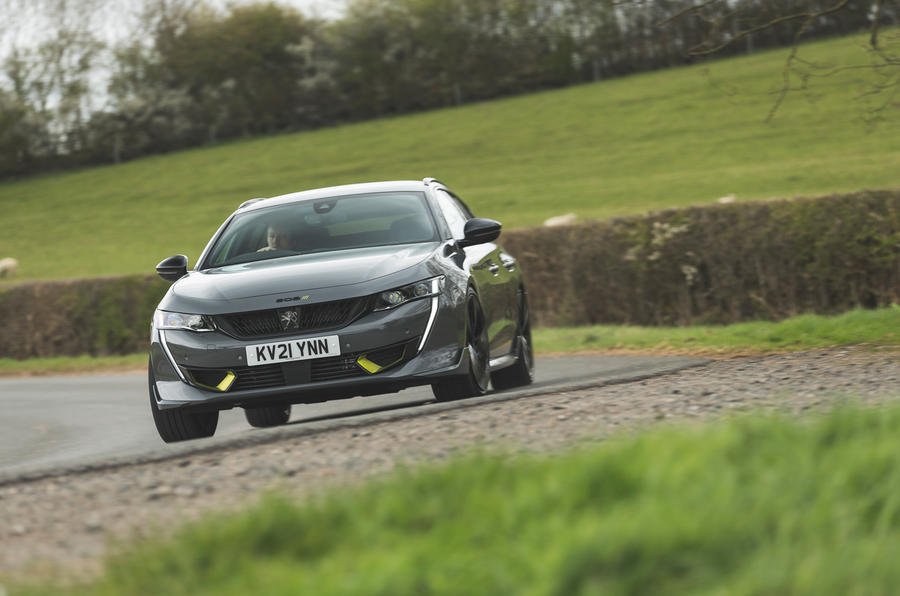Peugeot has been on a roll recently.
After several years of visually underwhelming models, the French firm has well and truly recovered its position as a style icon for the everyday driver. The Peugeot 508, offered in both Fastback and SW estate bodystyles and introduced in 2018, is a fine case in point. Not only is it a looker, but it’s also practical, good to drive and a capable rival for the segment-leading Volkswagen Passat and Skoda Octavia.
With several powertrain variants available, the 508 can cover a wide spectrum of duties. Diesel options are the cheapest on the used market and the range opens with a 1.5-litre BlueHDi, which produces 128bhp for a 0-62mph time of 10sec. A more powerful 2.0-litre diesel, also available since launch but removed from sale in 2021, comes in 161bhp and 175bhp guises.
For petrol, drivers can choose from a 129bhp 1.2-litre and a 1.6-litre unit with outputs of 179bhp and 218bhp. In its 218bhp guise, the 508 offers a punchy 0-62mph time of 7.4sec. A plug-in hybrid arrived in 2019, using a 1.6-litre petrol engine and an electric motor for a combined 222bhp. The model achieves 0-62mph in 8.3sec and has an electric-only range of up to 32 miles.
In 2020, the Peugeot Sport Engineered (PSE) performance model joined the range. The most powerful Peugeot production car yet, it pumps out 355bhp and 383lb ft from its plug-in hybrid powertrain and has a 0-62mph time of 5.2sec.
All engines provide decent performance, with smooth power delivery, but the 508’s cruising capabilities are certainly more of a draw than its straight-line pace. Fans of outright speed will be better off with rivals such as the Audi A4 and the BMW 3 Series.
Where the 508’s engines might leave some drivers wanting more, its handling is fluid and direct. The model also offers a largely comfortable ride, but steer clear of those 19in alloys if you want the best comfort the 508 has to offer.
In terms of equipment, launch models were offered with Active trim as the entry-level spec, which included 17in alloy wheels, sat-nav, automatic headlights, a 12.3in digital instrument cluster and an 8.0in infotainment system.
Next-step Allure trim is our pick of the range because it comes with active suspension, keyless entry, a 10.0in touchscreen, all-round electric seats, a reversing camera and active blindspot detection.
There’s also GT Line, which adds ambient lighting and self-levelling LED headlights among other features, and the top-of-the-range GT trim, which gains adaptive cruise control, lane-keeping assistance, 19in wheels and a Focal audio system.
From September 2020, the 508’s equipment levels were refreshed to, in rising levels of kit, Active Premium, Allure Premium, GT and GT Premium. With the changes came a few styling tweaks, including black door mirrors, a dark chrome grille for GT cars and full LED lights on all models as standard.
Need to know
The Peugeot Sport Engineered (PSE) model features three-mode shock absorption, a slightly lower ride height, better brakes and 20in alloy wheels with Michelin Pilot Sport 4S tyres. Used prices start at £40,000.
At launch, new prices began at £25,000 for the Fastback and £26,845 for the SW estate. Today, used Fastback prices start from £16,000 for a model with around 60,000 miles on the clock. Less run-in Fastback models are priced from around £17,500, but estate cars kick off at around £18,000.
A five-star Euro NCAP safety rating for the 508 SW was underpinned by an impressive 96% score for adult occupancy, 86% for children, 71% for vulnerable road users and 79% for the safety assist systems.
Buyer beware
Now you see it: The 508’s rear visibility is compromised by the rear headrests and the small back window. The rear pillars and small mirrors don’t help, either, so you might want to seek out a car with parking sensors or a rear-view camera – standard on Allure trim.
PHEV eats spare wheels: If you choose the plug-in hybrid, you will lose your spare wheel, which usually sits under the floor of the boot. The space is taken up by PHEV-related hardware, but you do get a tyre repair kit.
Recall issue: A fault can occur on models built between 8 November 2017 and 29 January 2021 where fuel can leak due to cabling and software upgrade issues. Some 10,695 cars were recalled, with Peugeot’s 508 and Rifter both affected.
Our pick
1.5 BlueHDi 130: This particular diesel packs enough power and has ample refinement. You will save a few pennies to put towards a higher trim level, too.
Wild card
Peugeot Sport Engineered: Peugeot’s most powerful production car yet, the 355bhp 508 PSE plug-in hybrid has enjoyably rapid performance. It also has an official 26-mile electric-only range and is rated at 138.9mpg combined.
Our top spec
Allure: A larger touchscreen and active suspension are two key attractions but this well-equipped trim level offers many more, including value for money.
Ones we found
2019 Peugeot 508 Fastback 1.6 Allure, 17,000 miles, £19,298
2019 Peugeot 508 SW 1.5 Blue HDi Allure, 14,000 miles, £20,999
2019 Peugeot 508 Fastback 2.0 BlueHDi GT Line, 16.000 miles, £20,495

